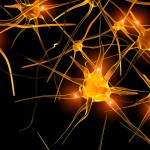 A study from Johns Hopkins researchers found evidence of the formation of new nerve cells (or neurons) in the brain, which may affect eating habits and consequently body weight. The findings of their animal study showed that new nerve cells produced in the hypothalamus area of the brain can influence weight gain. While research has shown that the brain produces new neurons well into adulthood, it had only been shown that this process, called neurogenesis, occurs in two parts of the brain–the olfactory bulb, involved in smell and the hippocampus, involved in memory. Recently, however, it has been proposed that neurogenesis also occurs in the hypothalamus, which is associated with many bodily functions, such as sleep, body temperature, hunger and thirst. Prompted by this proposal, the researchers set out to determine the source of the neurogenesis as well as how the new neurons function.
A study from Johns Hopkins researchers found evidence of the formation of new nerve cells (or neurons) in the brain, which may affect eating habits and consequently body weight. The findings of their animal study showed that new nerve cells produced in the hypothalamus area of the brain can influence weight gain. While research has shown that the brain produces new neurons well into adulthood, it had only been shown that this process, called neurogenesis, occurs in two parts of the brain–the olfactory bulb, involved in smell and the hippocampus, involved in memory. Recently, however, it has been proposed that neurogenesis also occurs in the hypothalamus, which is associated with many bodily functions, such as sleep, body temperature, hunger and thirst. Prompted by this proposal, the researchers set out to determine the source of the neurogenesis as well as how the new neurons function.
The researchers figured out the source of the new nerves through injecting mice with a compound called bromodeoxyuridine (BrdU), which selectively incorporates itself into newly replicating DNA of dividing cells. They found high levels of BrdU in an area of the hypothalamus called the median eminence, and found that these rapidly proliferating cells were tanycytes, which are a good candidate for producing new neurons. They then bred mice with a fluorescent protein to confirm that the nerve cells were produced by the tanycyte.
Next, the researchers studied the function of the new neurons by feeding mice a high-fat diet, which is known to put people at risk for obesity and metabolic syndrome. In adult mice on the high-fat diet, neurogenesis quadrupled. They put on more weight and had higher fat mass than mice on a standard diet. The researchers then used X-ray beams to kill off the new nerve cells in the median eminences area of the brain in the mice on the high-fat diet. It resulted in the mice gaining significantly less weight and fat than animals that had eaten the same diet and were considerably more active, suggesting that these new neurons play an essential part in the regulation of weight, fat storage and energy expenditure.
Lead researcher, Seth Blackshaw, PhD, an associate professor at John Hopkins School of Medicine, explained that while this process would be advantageous in the times of our ancestors; in today’s developed countries where we have seemingly unlimited access to food, it is not necessary. It could in fact promote excessive weight gain, as well as fat storage. The findings may eventually be used to treat obesity by inhibiting hypothalamic neurogenesis, either through irradiating the median eminence or creating drugs that inhibit this process.
“This is exciting research particularly as it pertains to bariatric surgery of all types,” said Dr. Layton Alldredge, expert weight loss surgeon in Salt Lake City. “We are beginning to understand that our original concepts of bariatric surgery were way too simplistic. We tended to think of the procedures in terms of the mechanical changes they produced—restriction, malabsorption, etc.” Dr. Alldredge concluded that “we are beginning to understand that the neurohumoral effects of these procedures may be their primary mechanism of action. It is an area we are just beginning to explore.”
Related Reading: Brain’s Insulin Activity Can Lead to Obesity






Weight Loss Studies & Clinical